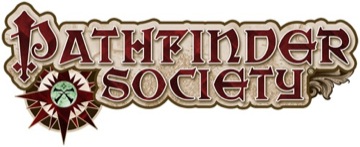You may recall that back in November we first announced the idea of Faction Journal Cards, a new way to contribute to your faction's goals while also being able to experience the fun of factions in any adventure—even sanctioned Modules and Adventure Paths. Mike and I have both released some spoilers since then, showing off bits and pieces of the Silver Crusade's card to illustrate how the cards work.
I'm pleased to announce that the Faction Journal Cards are now available for download and use in Pathfinder Society Organized Play! The download includes an introduction explaining how to use the cards, but I'll also break the main concepts into a quick Q&A here.
Do I have to do anything special to get a Faction Journal Card?
Nope, you get one for free so long as you are a member of the faction. These cards are 100% voluntary, so you can ignore them if you want.How do they work?
Let me summarize this quickly. Each card has three boons that your character can earn by completing certain goals on the back of the card. If you fulfill one of the goals during an adventure, you get to check one of the goal's checkboxes when you're receiving your Chronicle sheet. You unlock the boons based on how many goal's you have completed.I am the GM more often than I play. Do these cards offer me anything?
Yes, there is a special faction goal that appears on each card and rewards a participant when she is the GM and applies the Chronicle sheet to that character. To get the full benefits of the card, you'll still need to play, but at least you're not missing important opportunities by applying GM credit to a character.Some of these goals are really open-ended. Is that on purpose?
Yes. As noted, some are open-ended and others are very precise, and that's by design. It broadens the opportunities that PCs have to pursue these objectives, rather than forcing them to cherry-pick the one or two scenarios that would work—even tougher if you've already played that adventure. What this means is that there is a little GM interpretation involved in whether or not a PC actually fulfilled an objective. The Faction Journal Cards' introductory page advises GMs to err on the side of leniency when making that call.One Liberty's Edge goal requires me to free slaves. Can I just find a random slaver, beat him up, and profit?
No, those conditions need to be part of the adventure you're playing. If the scenario involves slaves or other captives already, get ready to check off a box. If a scenario doesn't involve them, save it for another day. Remember that these goals (and cards) are supposed to be minimally disruptive to the game, and starting a fight that's not part of the adventure puts a burden on the GM and steals the spotlight from the other players.I changed my faction after earning a few boons. What happens?
When you change your faction, you lose all benefits of any other faction's card.I completely filled out my Faction Journal Card. Now what?
The good news is that we're hoping to release updated card sets for future seasons, each with some familiar goals and some new ones.
I would also like to thank both our new assistant developer Linda Zayas-Palmer for her valuable assistance in finishing this project and a local group of venture-officers and Pathfinder Society enthusiasts who have provided important feedback and playtesting as we have played through The Emerald Spire Superdungeon.
Get going and download the Faction Journal Cards! I'm excited to hear what you think of these!
John Compton
Developer













